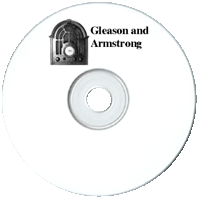

A "Road Trip/Buddy Movie" presented as a syndicated radio serial.

103 old time radio show recordings
(total playtime 15 hours, 10 min)
available in the following formats:
1 MP3 CD
or
15 Audio CDs
Text on OTRCAT.com ©2001-2025 OTRCAT INC All Rights Reserved. Reproduction is prohibited.

The Western Genre, another indelibly American form, often takes the form of Road Movie. Settlers crossing the prairie to start a new life, the great cattle drives, travel and the West are nearly inseparable. Stagecoach's Stagecoach (1939) starring John Wayne epitomizes the theme of travel bringing people together as much as it moves them apart. Frank Capra's It Happened One Night (1934) pairs Clark Gable and Claudette Colbert is a seemingly more superficial tale where the travel liberates a wealthy and pampered woman from her predestined life to discover the hopefulness of "real people" in Capra's utopian vision of America.
Road films are usually also "Buddy Pictures" where the traveling pair may or may not have a close relationship at the beginning but are inseparable by the time the closing credits roll. "Screwball Comedies" are often more buddy pictures than romances, and even in situations where the antagonist is determined to take advantage of the protagonist, by the time their travels together are complete, there is too much affection between them to allow any true or lasting evil.
Gleason and Armstrong was essentially a Buddy/Road Movie in the form of a syndicated radio serial. Recorded and distributed by Hollywood Broadcast Features, there were more than one hundred ten-minute episodes. Like the partners in so many buddy pictures, there is a wide-eyed optimist, Robby in this case, and a more hard-bitten but not-a-smart-as-he-thinks-he-is one, Jimmy. Robby is in love with a girl and he is planning on opening a filling station with Jimmy on land he will buy from her father, but first, the partners plan to drive around the country to learn what it takes to run the best possible service station. Robby's potential father-in-law agrees to finance the trip by letting the partners sell his patented tire puller around the country. It all seems a plot to keep the pair on the road and his daughter from marrying, but the pair manages to venture out into Depression-era America.

Robby and Jimmy find plenty of adventure as they cross the country, have run-ins with the law and a few bad guys, pick up a young companion named Oswald in Ohio and a dog named Scram in Texas, get jobs in the St. Louis Zoo and let all the animals escape, judge a beauty contest, and find dinosaur footprints in the desert. By the time they reach Los Angeles in Episode 103 they are determined to get into pictures but end up arrested by a radio car in a burger joint.
James Gleason was awarded a Star on the Hollywood Walk of Fame at 7038 Hollywood Blvd for his work in Motion Pictures. He passed away on April 12, 1959. Robert Armstrong died on April 20, 1973. He was 82.
Text on OTRCAT.com ©2001-2025 OTRCAT INC All Rights Reserved. Reproduction is prohibited.
You have reached the maximum number of votes for a unregistered user.
Please login or create a new account to continue...
You have reached the maximum number to down votes in this page.



Gleason and Armstrong Disc A001
|
Add Audio CD to Cart - $5.00 |
Gleason and Armstrong Disc A002
|
Add Audio CD to Cart - $5.00 |
Gleason and Armstrong Disc A003
|
Add Audio CD to Cart - $5.00 |
Gleason and Armstrong Disc A004
|
Add Audio CD to Cart - $5.00 |
Gleason and Armstrong Disc A005
|
Add Audio CD to Cart - $5.00 |
Gleason and Armstrong Disc A006
|
Add Audio CD to Cart - $5.00 |
Gleason and Armstrong Disc A007
|
Add Audio CD to Cart - $5.00 |
Gleason and Armstrong Disc A008
|
Add Audio CD to Cart - $5.00 |
Gleason and Armstrong Disc A009
|
Add Audio CD to Cart - $5.00 |
Gleason and Armstrong Disc A010
|
Add Audio CD to Cart - $5.00 |
Gleason and Armstrong Disc A011
|
Add Audio CD to Cart - $5.00 |
Gleason and Armstrong Disc A012
|
Add Audio CD to Cart - $5.00 |
Gleason and Armstrong Disc A013
|
Add Audio CD to Cart - $5.00 |
Gleason and Armstrong Disc A014
|
Add Audio CD to Cart - $5.00 |
Gleason and Armstrong Disc A015
|
Add Audio CD to Cart - $5.00 |
Please wait...
COMMENTS
staton Verified Purchase
Leave a comment